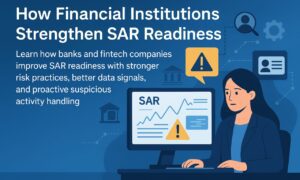The looming recession in the UK is expected to be delayed according to economists and the Bank of England predicts when it does hit, it will be the longest on record, a four-quarter recession. History shows recessions take a toll on financial institutions as fraudsters take advantage of the financial situation. The University of Portsmouth studied three recessions and found a correlation between the fall in the GDP and rise in fraud offenses. During the last UK recession in 2020, all fraud rose by 25% and computer misuse (such as hacking information) increased by 89% according to the Office of Data and National Statics.
Recessionary fraud looks different than fraud in a healthy economy because it creates motivation to commit fraud. In addition to the already common career fraudster, financial institutions need to be aware of opportunists and internal fraud.
An opportunist fraudster is often an average person, who commits a type of fraud for the first time and then may repeat it. People sometimes turn to fraud when their financial situation changes, such as job loss, and they are looking for ways to make ends meet or continue their current lifestyle. During good financial times, people don’t really look for loopholes to get some money out of things or abuse systems. During an economic decline the average person is more likely to commit fraud in several ways; through falsifying documents, loans, Buy Now Pay Later, false bank disputes or internally.
The opportunist may become tempted to falsify information for a loan that they cannot repay or intentionally apply for loans they cannot afford. People may submit applications for personal loans or open new credit cards and max them out before filing for bankruptcy.
Another type of fraud committed by an opportunist that is expected to increase in an economic downturn is a type of Buy Now Pay Later fraud, where the customer never pays off the loan for the item or claims they never received an item when they did. A similar type of fraud is currently on the rise with banks, which is false bank disputes. More bank customers are scrutinizing their statements and making claims on payments they don’t recognize. EY says more than 77% of bank disputes are friendly fraud, costing banks tens of billions of pounds.
Financial institutions also need to be alert for internal fraud which is expected to have a large jump during a recession. Again, this type of fraud may be administered by someone who has no history of fraud but finds themselves in a desperate financial situation. They then may be trying to become creative in how to make ends meet and while working in an environment with money- they’ve found their opportunity. There is also another type of internal fraud where someone may steal proprietary information or valuable customer information to sell.
No matter the type of fraudster there are three things they all have in common, opportunity, motivation and rationale, which make up the fraud triangle, a theory developed by three criminologists according to one of the creator’s history. The opportunity is the gap in the system. Motivation may be a financial hardship and the rationale is economic uncertainty. So how do financial institutions close the opportunity gap?
Financial institutions can prevent some fraud by looking at their internal education practices that include risk awareness and making sure those are continued and up to date. They also need to conduct risk assessments that include multiple layers of people taking part in a task for a system of checks and balances. While those things are done from a people perspective technology also needs to play a role to help mitigate the financial burden of fraud. Fraud prevention technology should be able to detect anomalies in people’s activities, whether it’s an employee spending an unusual amount of time across different high-profile accounts or an individual requesting multiple loans. Technology should be able to interpret behavior and determine if it is unusual. Ultimately financial institutions need end-to-end technology to pick up where the in-person interactions stop and assess the journey of employees and customers in the digital space.
Reference:
https://www.fraud-magazine.com/



































